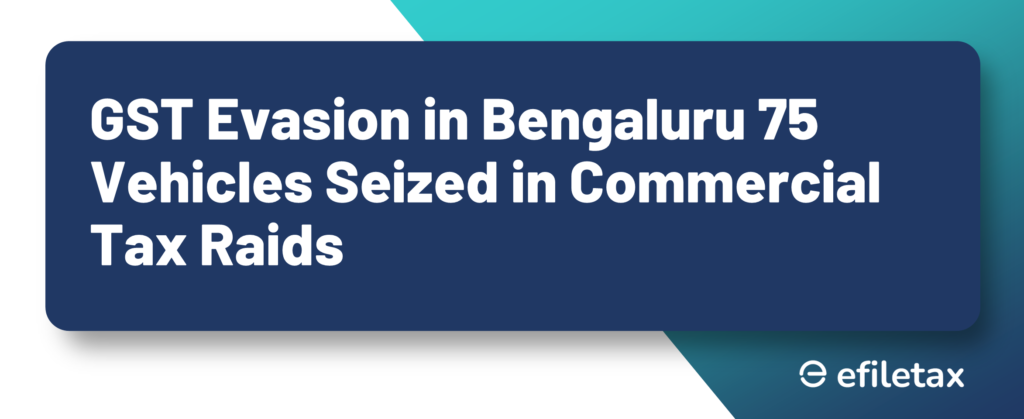
Intro Paragraph:
GST evasion in Bengaluru has come under the scanner after massive commercial tax raids led to the seizure of 75 vehicles. The Karnataka Commercial Taxes Department cracked down on transporters for moving goods without valid e-way bills — a serious offence under GST laws. Here’s a simplified breakdown of the case and what it means for businesses.
What Triggered the GST Raids in Bengaluru?
According to a recent press release by the Karnataka Commercial Taxes Department, a coordinated drive was conducted across key highway checkposts and warehouses in Bengaluru and surrounding districts.
Key Highlights:
- 75 goods vehicles seized for non-compliance.
- Transporters failed to generate valid e-way bills.
- Raids involved real-time tracking and verification using GSTN data.
- Over ₹6 crore worth of goods suspected to be moved without tax.
What Is an E-Way Bill and Why Does It Matter?
An e-way bill is mandatory for transporting goods worth more than ₹50,000 under Rule 138 of the CGST Rules, 2017.
Without a valid e-way bill, businesses risk:
- Seizure of goods and vehicles
- Heavy penalties under Section 129 of the CGST Act
- Interruption to supply chain and logistics
| Condition | Penalty Without E-Way Bill |
|---|---|
| Goods + Vehicle seized | 100% of tax payable + goods confiscation |
| Only goods seized | 100% of tax + 100% of value as penalty |
Legal Basis for Action
The recent crackdown relies on:
- Section 68 of CGST Act: Allows interception and inspection during movement.
- Rule 138B: Authorises officers to verify e-way bill during transit.
- Section 129: Prescribes detention, seizure and release procedures.
👉 For full legal text, visit: https://cbic-gst.gov.in
Expert Insight: What Should Businesses Do?
📌 Tip by GST Consultant (CA S. Natarajan):
“Even a technical lapse in e-way bill generation can lead to detention. Always double-check the validity, route, and timing before goods move. Automate compliance if needed.”
How Can You Stay Compliant and Avoid Such Raids?
- Generate e-way bills on time using the GST portal or automated tools.
- Train staff and drivers on documentation and compliance basics.
- Update transporter and consignment details accurately.
- Maintain real-time records for audit trails.
- Use Efiletax’s GST support services to reduce compliance errors.
FAQs
Q1: Is e-way bill needed for local delivery within city limits?
A: If the value exceeds ₹50,000, yes – even for intra-state movement in many states including Karnataka.
Q2: What if goods are detained but tax is already paid?
A: You may still face penalties if e-way bill is not valid. Refer to Section 129(1) for exact relief options.
Q3: Can I appeal against vehicle seizure?
A: Yes, under Section 107 of CGST Act, you can file an appeal with proper documentation.
Summary
Karnataka tax raids seized 75 vehicles for GST evasion due to missing e-way bills. Businesses must comply with GST transport rules under Rule 138 and Section 129 to avoid penalties. Automating compliance and using verified tools like Efiletax can help prevent costly errors.